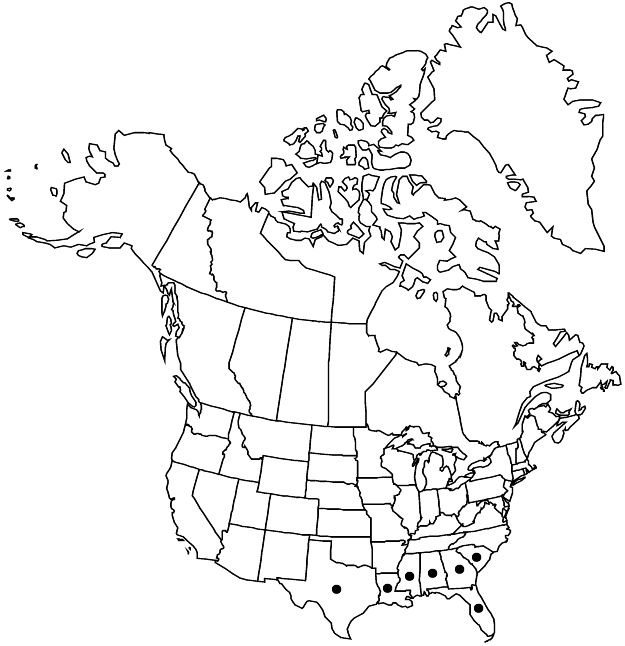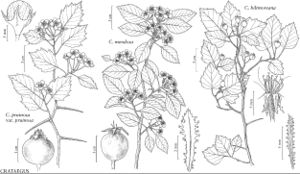Crataegus mendosa
Biltmore Bot. Stud. 1: 65. 1902.
Shrubs or trees, 30–60 dm. Stems: trunk bark not recorded; twigs: new growth reddish green, 1-year old shiny reddish or purplish brown, older dark or dull gray; thorns on twigs absent or few to numerous, straight or slightly recurved, 1-year old reddish black, 2-years old blackish, fine, 2–5 cm. Leaves: petiole length 30–50% blade, sparsely glandular; blade adaxially dark green, broadly oblong to elliptic or narrowly ovate, 4–7 cm, base cuneate, lobes 0 or 1–3, obscure, max LII 10%, margins crenate or crenate-serrate, veins 8 or 9 per side (fewer on smaller leaves), apex subacute (obtuse on some larger leaves), abaxial midvein sparsely hairy young. Inflorescences 4–7-flowered; branches glabrous; bracteoles caducous, dense, narrow, semiherbaceous (and green) to membranous, margins glandular. Flowers 14–17 mm diam.; sepals triangular, much shorter than petals, margins glandular-denticulate; anthers pink or pink-purple; styles 3–5. Pomes yellow-green with pink or salmon blush, or red, suborbicular to broadly ellipsoid, 8–10 mm diam.; sepals reflexed; pyrenes 3–5.
Phenology: Flowering Mar–Apr; fruiting Sep–Nov.
Habitat: Woodland edges, cut-over woodlands, brush
Elevation: 20–200 m
Distribution

Ala., Fla., Ga., La., Miss., S.C., Tex.
Discussion
Crataegus mendosa is scattered from southeastern Texas to western Georgia and northern Florida with a disjunct record in South Carolina. The species is one of the more distinctive members of the series, although it may be approached in form by C. gilva, which has an acuminate leaf apex, much sharper lobes (when present), and marginal teeth. The extension-shoot leaves of C. mendosa are ovate to broadly ovate, usually quite wide, with 3–4 subacute to acute lobes, which can be confusing if only few typical short-shoot leaves are present.
Plants from Sardis, Alabama, with similarities to Crataegus mendosa, C. opima, and C. pulcherrima, may key out here; they have leaf blades to 8 cm with shallow (LII 10–15%) sinuses and blunt to subacute lobe apices.
Selected References
None.
